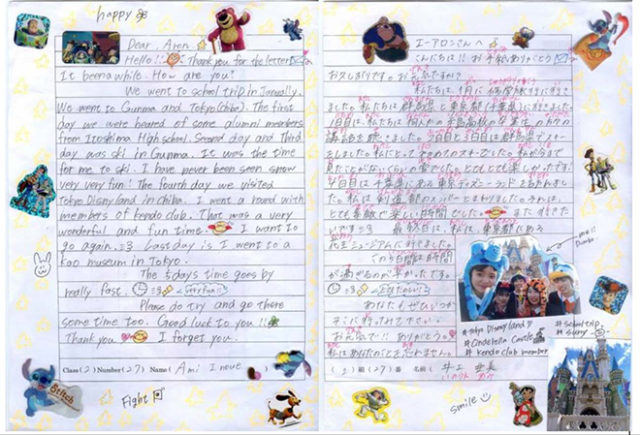by Bruce Rutledge
In these digital days, it seems that a handwritten note, perhaps with a scribbled drawing or an origami crane thrown in for good measure, still goes a long way. At least that’s the consensus of Toshishige Yamasaki of Itoshima High School and Lyn Jackson of Mariner High School in Everett. They have conducted a pen pal exchange with their respective students since 2009. And the simple exchanges have brought the students closer together.
Yamasaki has conducted pen pal exchanges with schools in California, Minnesota, Colorado and Florida since 1996. What started as a way to improve his students’ English has morphed over the years into an attempt to forge a better understanding of each other. “Right now, the purpose of our pen pal project is not to learn to use English,” Yamasaki says, “but to tell the people who are somewhat interested in Japan and the Japanese who we are, what we have, how we live here in Fukuoka.”
About 80 students in Mariner High School participate in the project, Jackson says. “Students write in both Japanese and English to their pals in Japan,” she says. “I think most of the Mariner students learn a lot about individual items in Japan. They learn about what kinds of music and entertainment Japanese kids do. They learn about school activities.”

For the Itoshima students, who live in a small town on the western edge of Fukuoka Prefecture, the exchanges can be eye-openers. “Most of the Itoshima students come to school by bicycle, and it is unthinkable for them to come to school by car. Many students want to be nurses, firefighters or hairdressers. They are not so interested in becoming a lawyer, doctor or animator. They never think of joining the army. With just a self-introduction letter, the students learn that young people in the partner country lead a different life.”
Students exchange three letters over the course of the school year. First, they write a self-introduction. Next, they write a New Year’s letter. And finally, they introduce a sightseeing spot in their country in the third letter.
A key change came when Yamasaki decided to scrap the typed letters in favor of handwritten ones. He made the change, he says, “mainly because students who were not good at writing long sentences could draw pictures and attach small items such as origami and a friendship bracelet called a micanga.”
Today, the letters are peppered with doodles and drawings, making them all the more personal. Students slip candy, photos and stickers into the envelopes. For nearly a decade, this little exchange has been pulling the students of Itoshima and Mariner just a little bit closer.
Yamasaki says he eventually plans to write a history of the pen pal project. But for now, he and his students concentrate on giving and receiving three very personal, handwritten letters a year.





